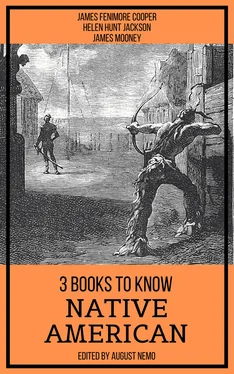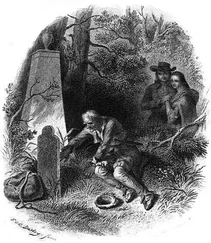“La Longue Carabine! La Longue Carabine!” passed from mouth to mouth, until the whole band appeared to be collected around a trophy which would seem to announce the death of its formidable owner. After a vociferous consultation, which was, at times, deafened by bursts of savage joy, they again separated, filling the air with the name of a foe, whose body, Heyward could collect from their expressions, they hoped to find concealed in some crevice of the island.
“Now,” he whispered to the trembling sisters, “now is the moment of uncertainty! if our place of retreat escape this scrutiny, we are still safe! In every event, we are assured, by what has fallen from our enemies, that our friends have escaped, and in two short hours we may look for succor from Webb.”
There were now a few minutes of fearful stillness, during which Heyward well knew that the savages conducted their search with greater vigilance and method. More than once he could distinguish their footsteps, as they brushed the sassafras, causing the faded leaves to rustle, and the branches to snap. At length, the pile yielded a little, a corner of the blanket fell, and a faint ray of light gleamed into the inner part of the cave. Cora folded Alice to her bosom in agony, and Duncan sprang to his feet. A shout was at that moment heard, as if issuing from the centre of the rock, announcing that the neighboring cavern had at length been entered. In a minute, the number and loudness of the voices indicated that the whole party was collected in and around that secret place.
As the inner passages to the two caves were so close to each other, Duncan, believing that escape was no longer possible, passed David and the sisters, to place himself between the latter and the first onset of the terrible meeting. Grown desperate by his situation, he drew nigh the slight barrier which separated him only by a few feet from his relentless pursuers, and placing his face to the casual opening, he even looked out, with a sort of desperate indifference, on their movements.
Within reach of his arm was the brawny shoulder of a gigantic Indian, whose deep and authoritative voice appeared to give directions to the proceedings of his fellows. Beyond him again, Duncan could look into the vault opposite, which was filled with savages, upturning and rifling the humble furniture of the scout. The wound of David had dyed the leaves of sassafras with a color that the natives well knew was anticipating the season. Over this sign of their success, they set up a howl, like an opening from so many hounds who had recovered a lost trail. After this yell of victory, they tore up the fragrant bed of the cavern, and bore the branches into the chasm, scattering the boughs, as if they suspected them of concealing the person of the man they had so long hated and feared. One fierce and wild-looking warrior approached the chief bearing a load of the brush, and pointing, exultingly, to the deep red stains with which it was sprinkled, uttered his joy in Indian yells, whose meaning Heyward was only enabled to comprehend by the frequent repetition of the name of “La Longue Carabine!” When his triumph had ceased, he cast the brush on the slight heap that Duncan had made before the entrance of the second cavern, and closed the view. His example was followed by others, who, as they drew the branches from the cave of the scout, threw them into one pile, adding, unconsciously, to the security of those they sought. The very slightness of the defence was its chief merit, for no one thought of disturbing a mass of brush, which all of them believed, in that moment of hurry and confusion, had been accidentally raised by the hands of their own party.
As the blankets yielded before the outward pressure, and the branches settled in the fissure of the rock by their own weight, forming a compact body, Duncan once more breathed freely. With a light step, and lighter heart, he returned to the centre of the cave, and took the place he had left, where he could command a view of the opening next the river. While he was in the act of making this movement, the Indians, as if changing their purpose by a common impulse, broke away from the cavern in a body, and were heard rushing up the island again, towards the point whence they had originally descended. Here another wailing cry betrayed that they were again collected around the bodies of their dead comrades.
Duncan now ventured to look at his companions; for, during the most critical moments of their danger, he had been apprehensive that the anxiety of his countenance might communicate some additional alarm to those who were so little able to sustain it.
“They are gone, Cora!” he whispered; “Alice, they are returned whence they came, and we are saved! To Heaven, that has alone delivered us from the grasp of so merciless an enemy, be all the praise!”
“Then to Heaven will I return my thanks!” exclaimed the younger sister, rising from the encircling arms of Cora, and casting herself with enthusiastic gratitude on the naked rock; “to that Heaven who has spared the tears of a gray-headed father; has saved the lives of those I so much love —”
Both Heyward, and the more tempered Cora, witnessed the act of involuntary emotion with powerful sympathy, the former secretly believing that piety had never worn a form so lovely as it had now assumed in the youthful person of Alice. Her eyes radiant with the glow of grateful feelings; the flush of her beauty was again seated on her cheeks, and her whole soul seemed ready and anxious to pour out its thanksgivings, through the medium of her eloquent features. But when her lips moved, the words they should have uttered appeared frozen by some new and sudden chill. Her bloom gave place to the paleness of death; her soft and melting eyes grew hard, and seemed contracting with horror; while those hands which she had raised, clasped in each other, towards heaven, dropped in horizontal lines before her, the fingers pointed forward in convulsed motion. Heyward turned, the instant she gave a direction to his suspicions, and, peering just above the ledge which formed the threshold of the open outlet of the cavern, he beheld the malignant, fierce, and savage features of Le Renard Subtil.
In that moment of surprise, the self-possession of Heyward did not desert him. He observed by the vacant expression of the Indian’s countenance, that his eye, accustomed to the open air, had not yet been able to penetrate the dusky light which pervaded the depth of the cavern. He had even thought of retreating beyond a curvature in the natural wall, which might still conceal him and his companions, when, by the sudden gleam of intelligence that shot across the features of the savage, he saw it was too late, and that they were betrayed.
The look of exultation and brutal triumph which announced this terrible truth was irresistibly irritating. Forgetful of everything but the impulses of his hot blood, Duncan levelled his pistol and fired. The report of the weapon made the cavern bellow like an eruption from a volcano; and when the smoke it vomited had been driven away before the current of air which issued from the ravine, the place so lately occupied by the features of his treacherous guide was vacant. Rushing to the outlet, Heyward caught a glimpse of his dark figure, stealing around a low and narrow ledge, which soon hid him entirely from sight.
Among the savages, a frightful stillness succeeded the explosion, which had just been heard bursting from the bowels of the rock. But when Le Renard raised his voice in a long and intelligible whoop, it was answered by a spontaneous yell from the mouth of every Indian within hearing of the sound. The clamorous noises again rushed down the island; and before Duncan had time to recover from the shock, his feeble barrier of brush was scattered to the winds, the cavern was entered at both its extremities, and he and his companions were dragged from their shelter and borne into the day, where they stood surrounded by the whole band of the triumphant Hurons.
Читать дальше












